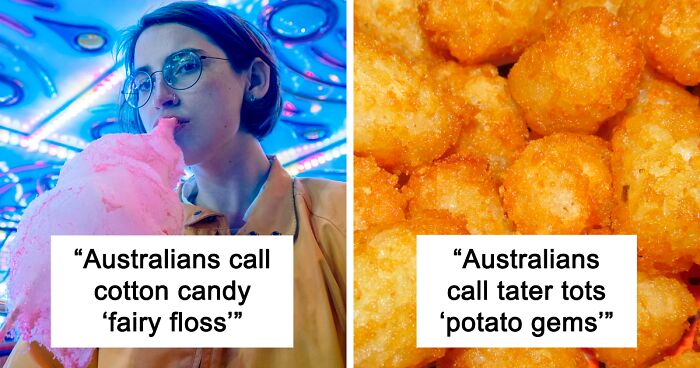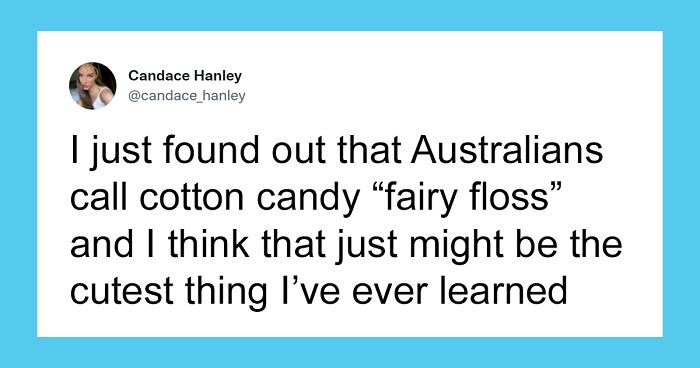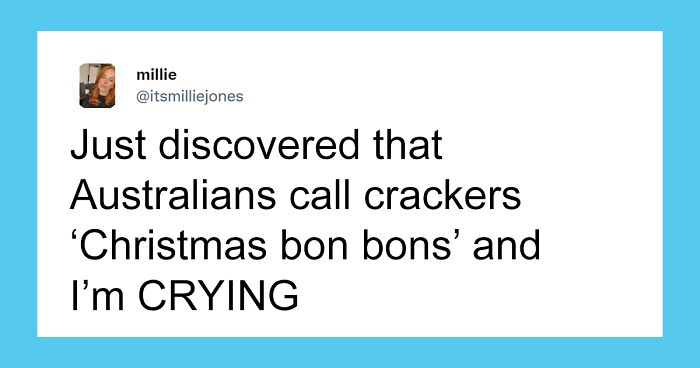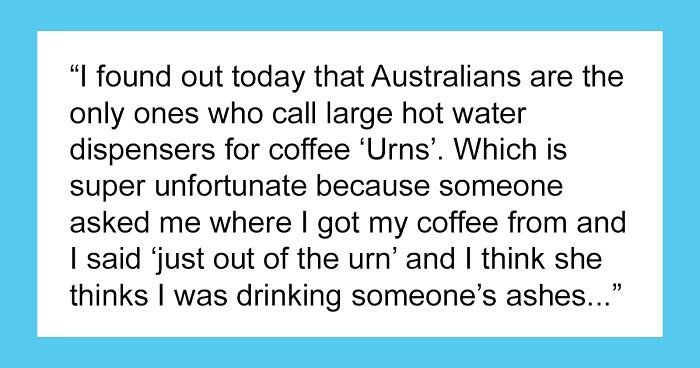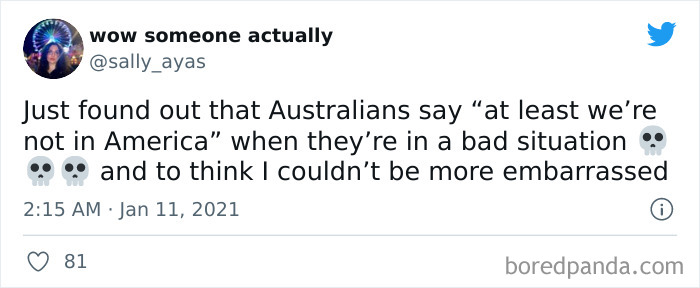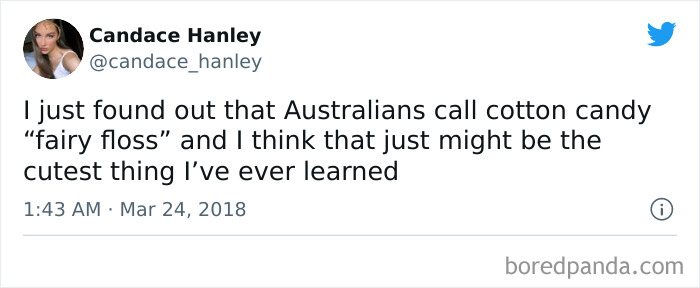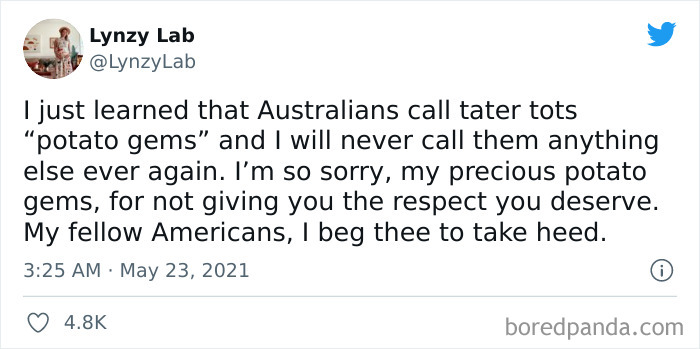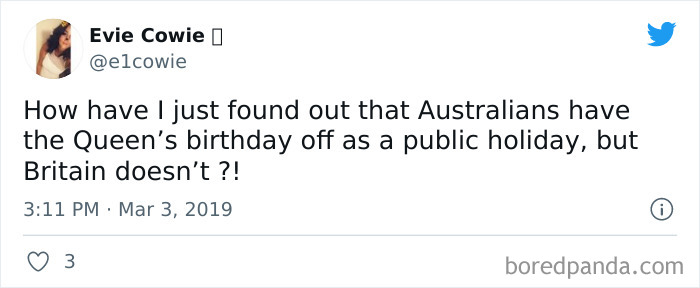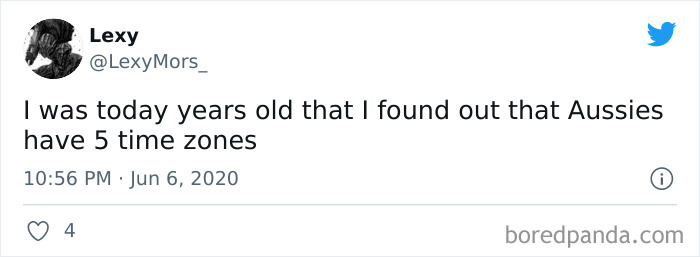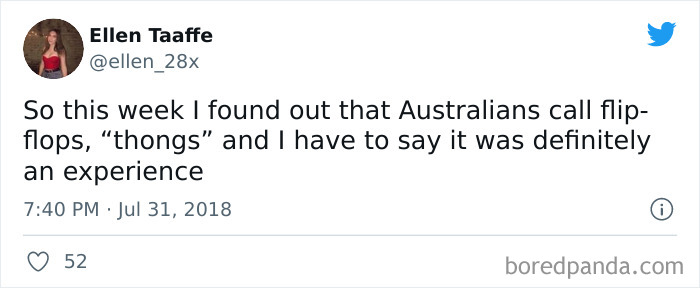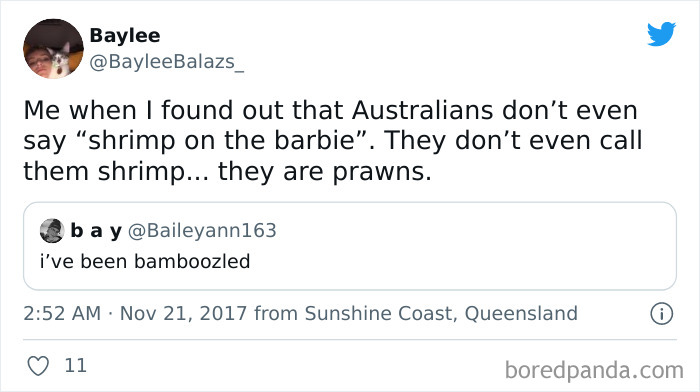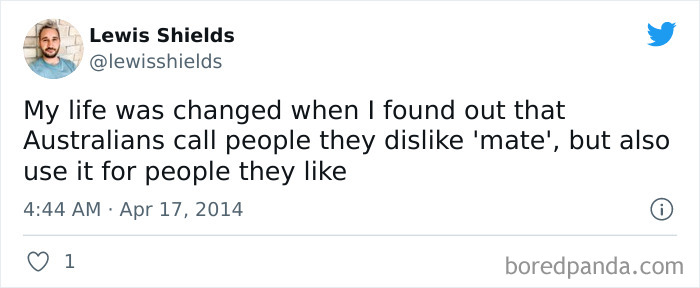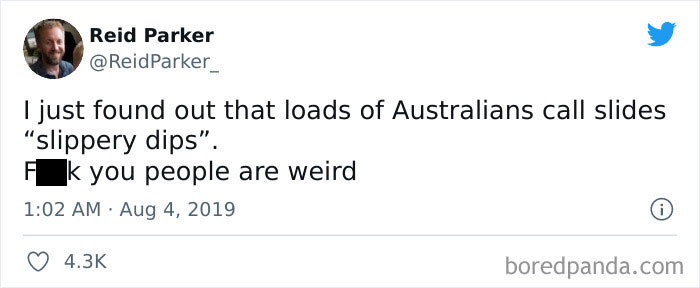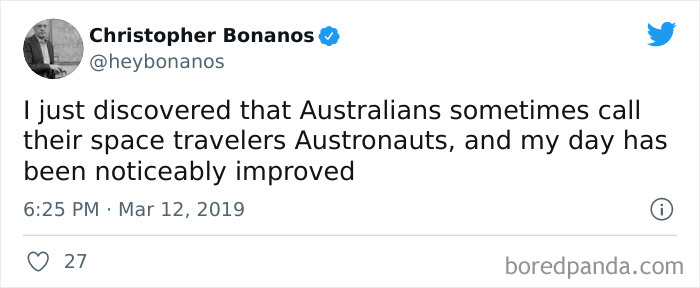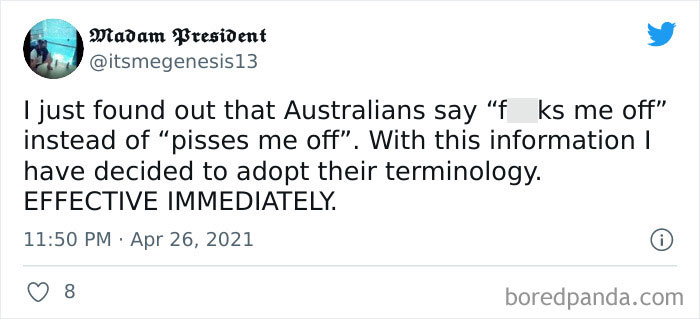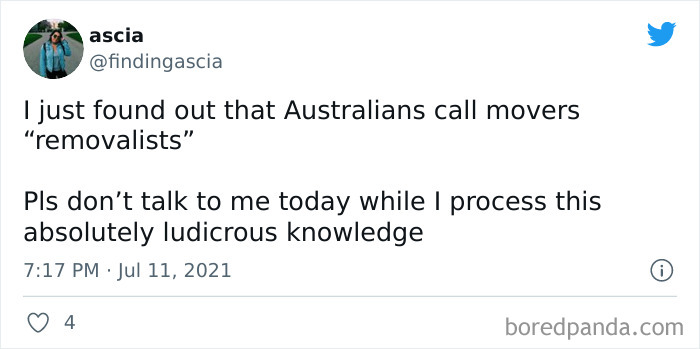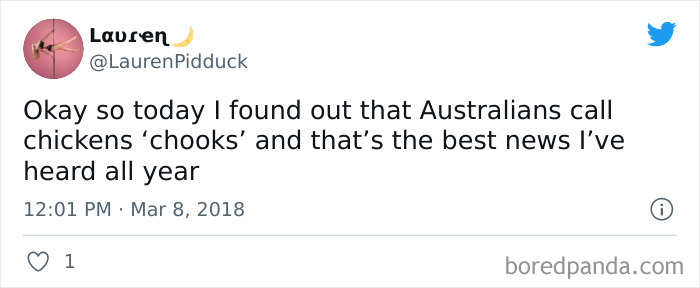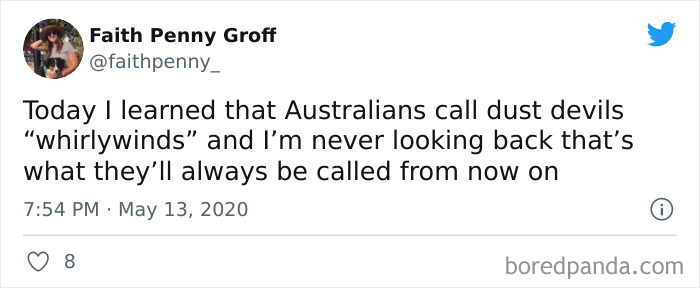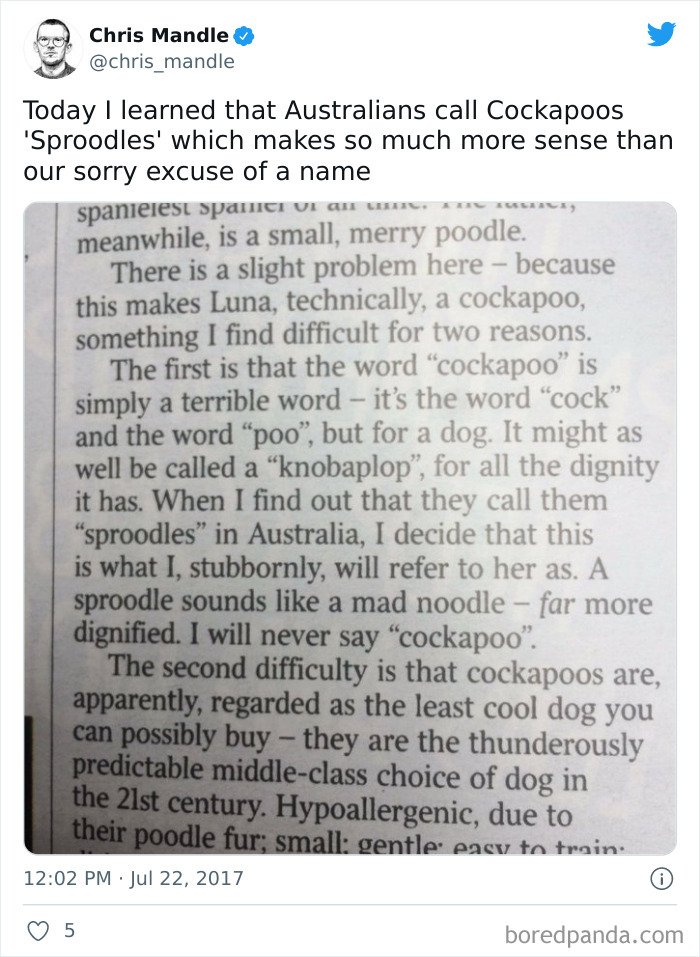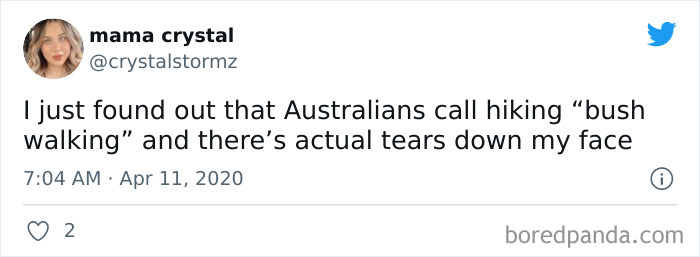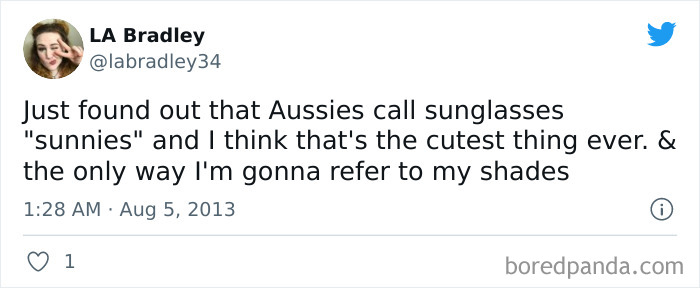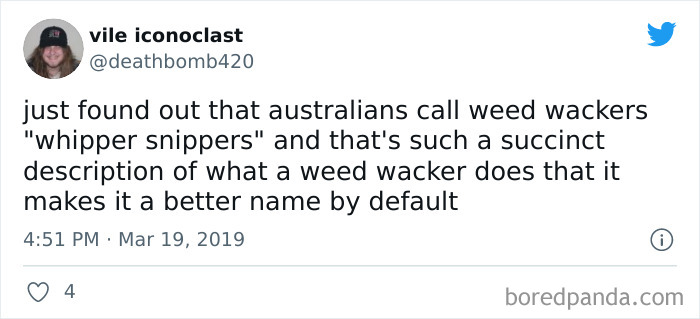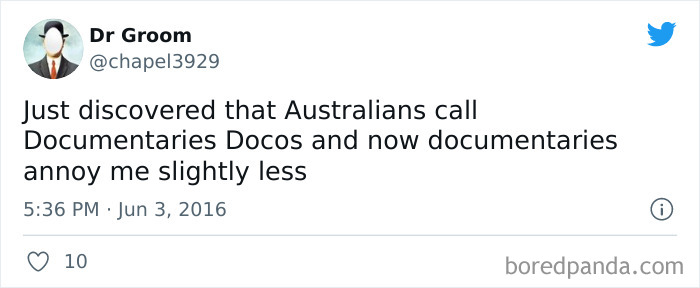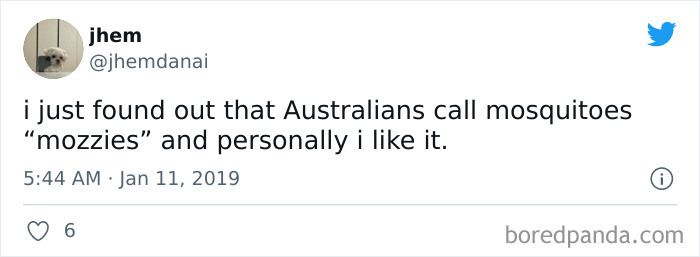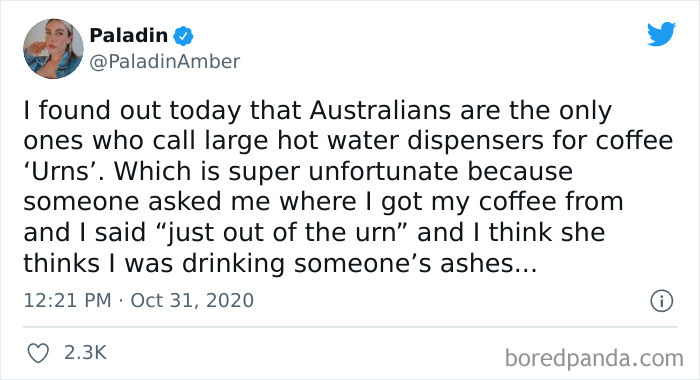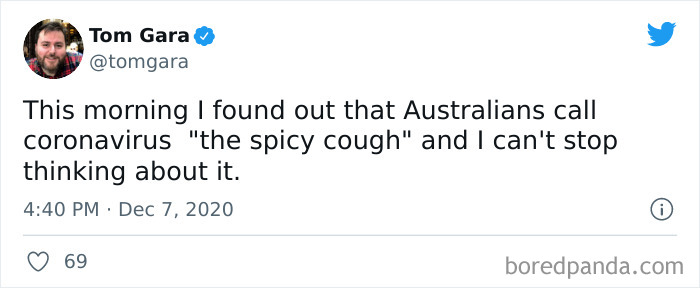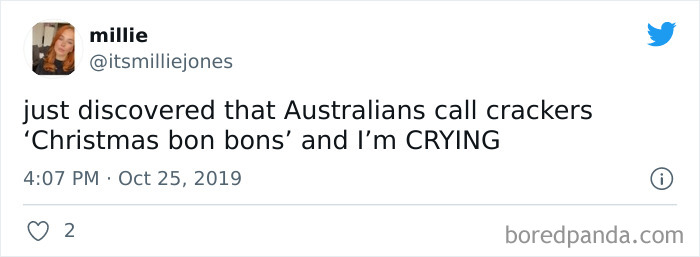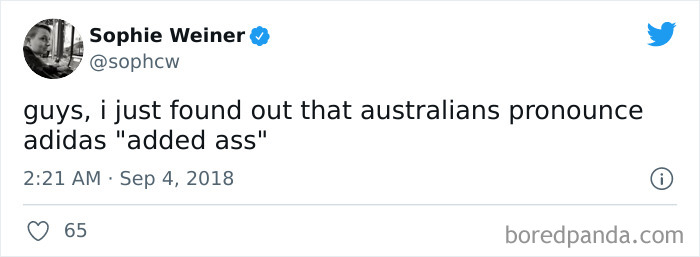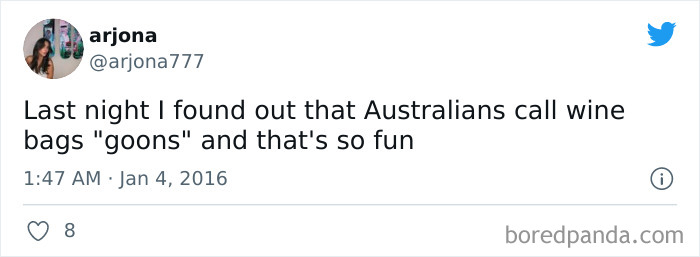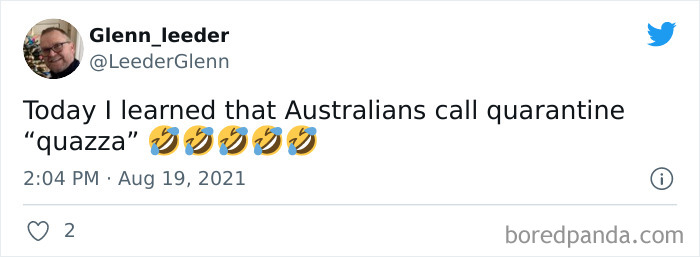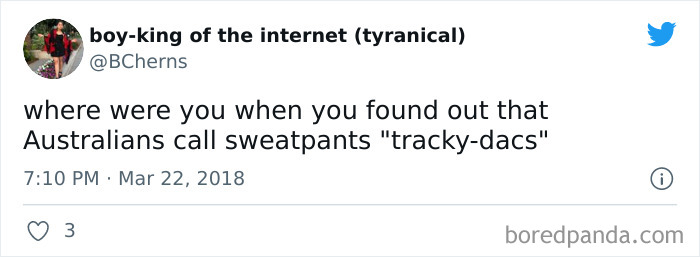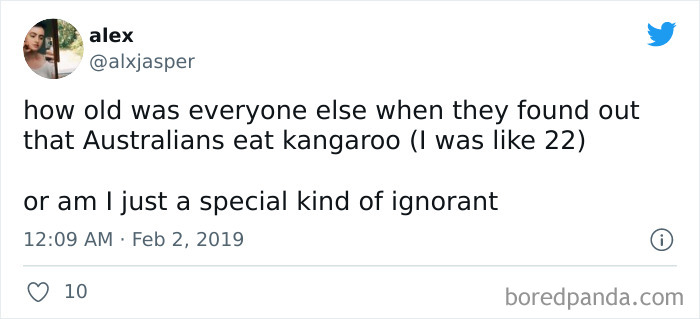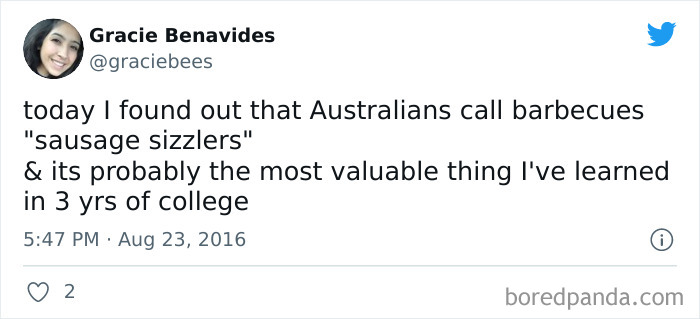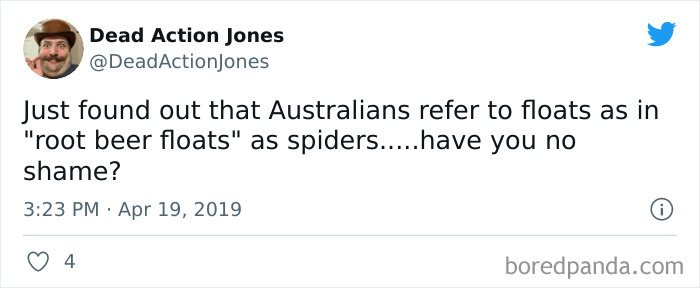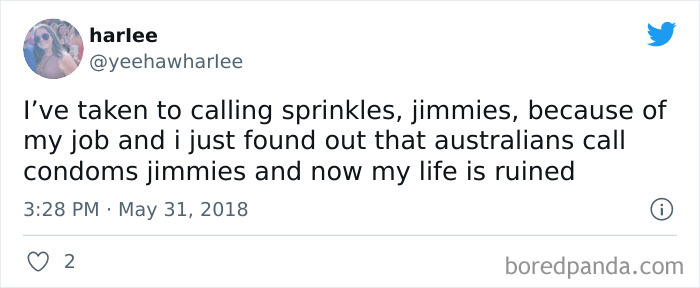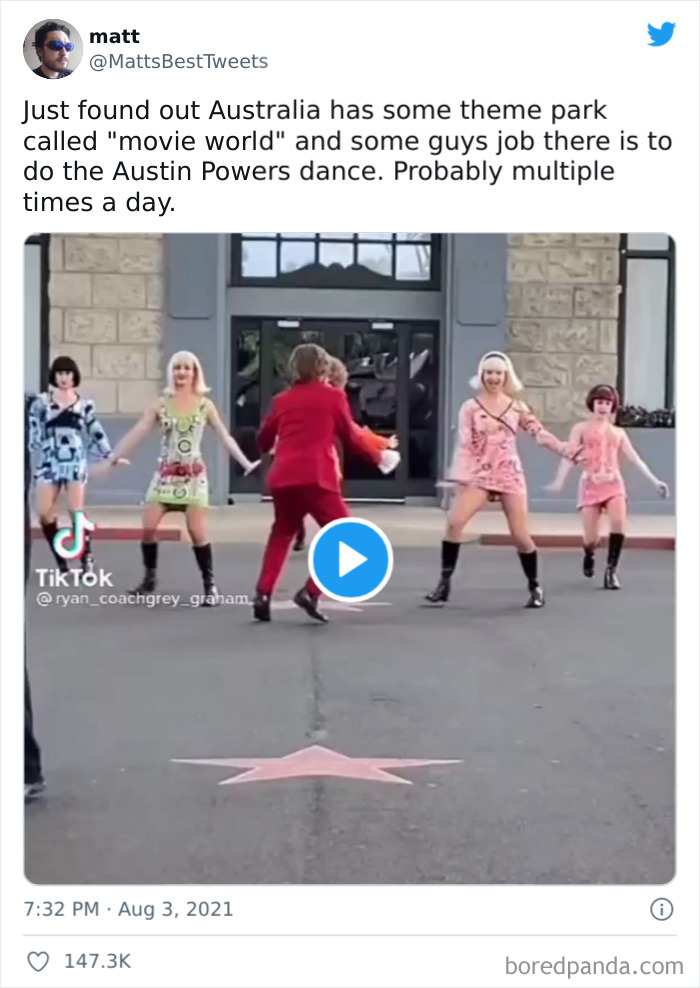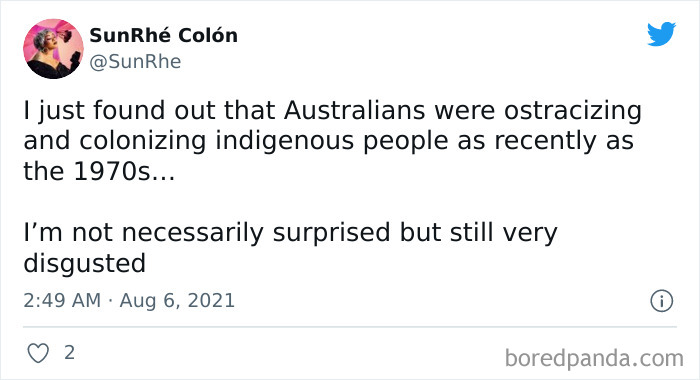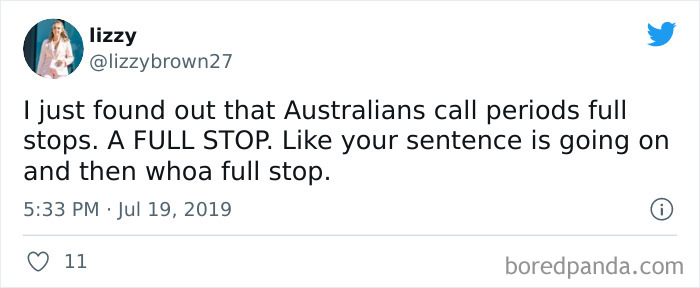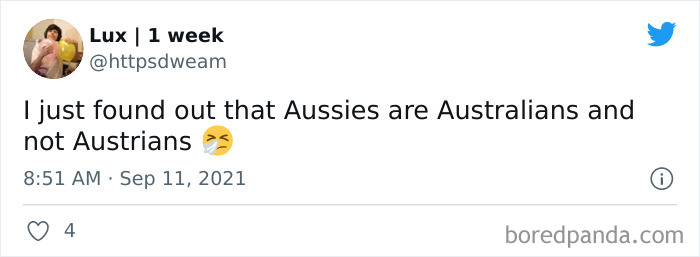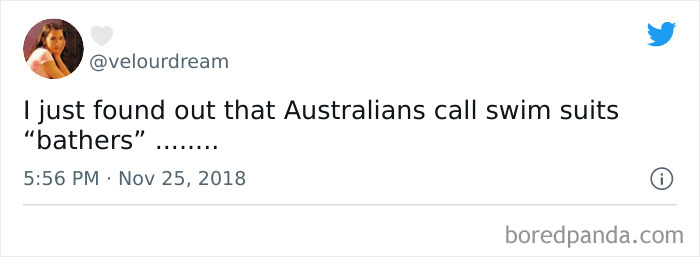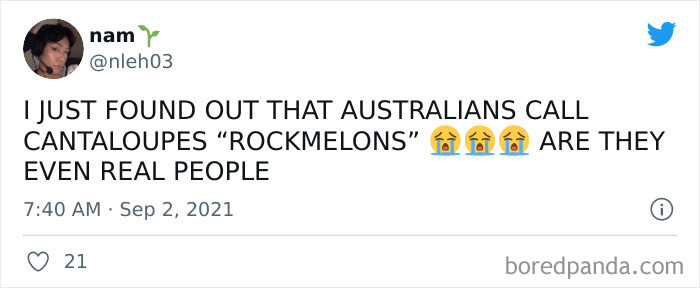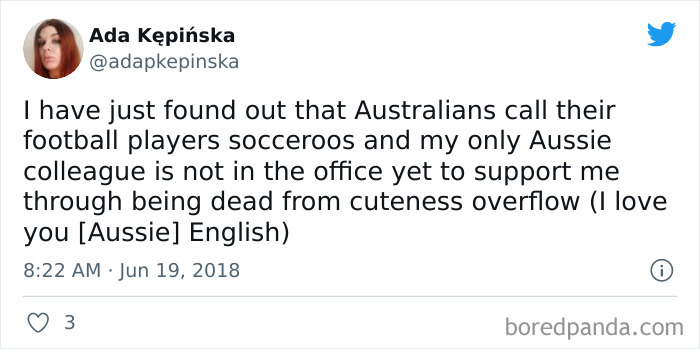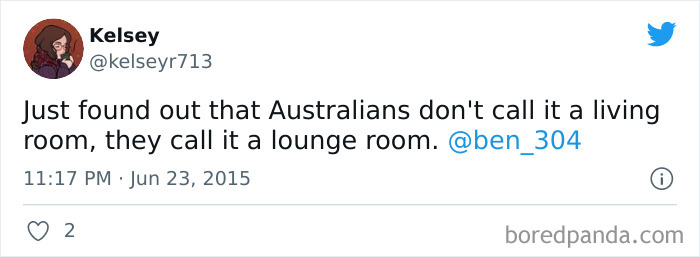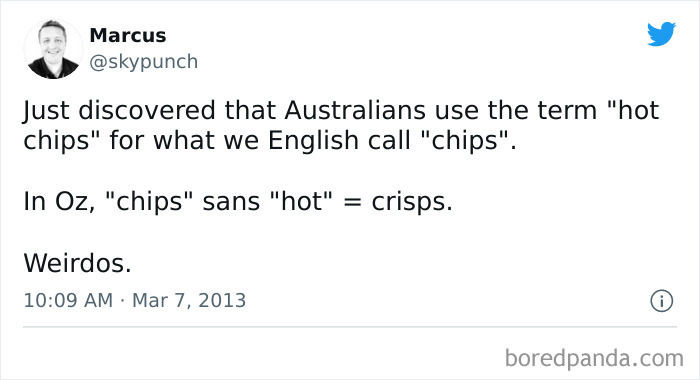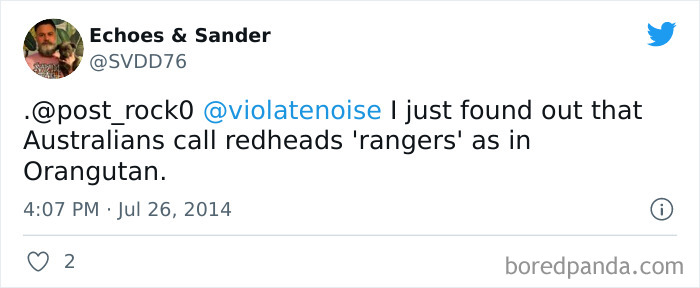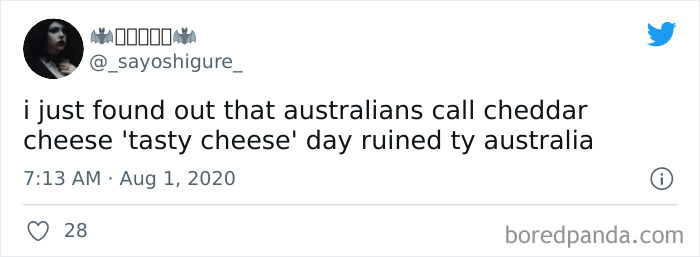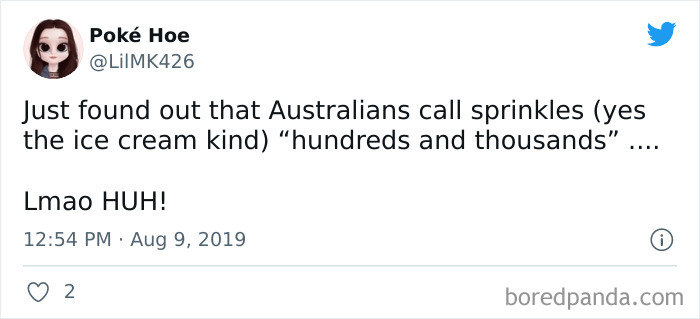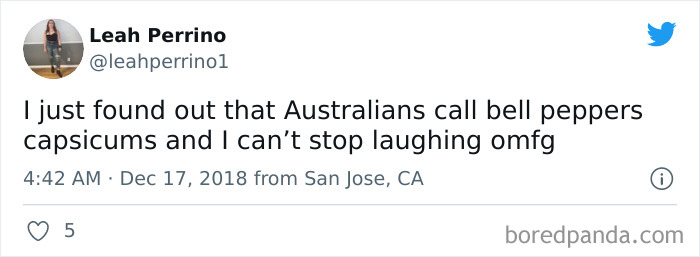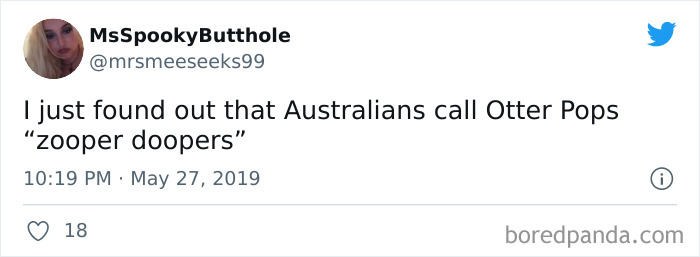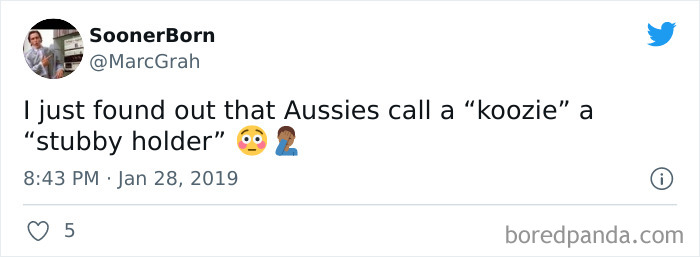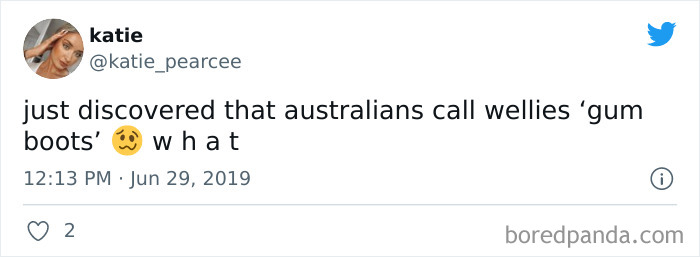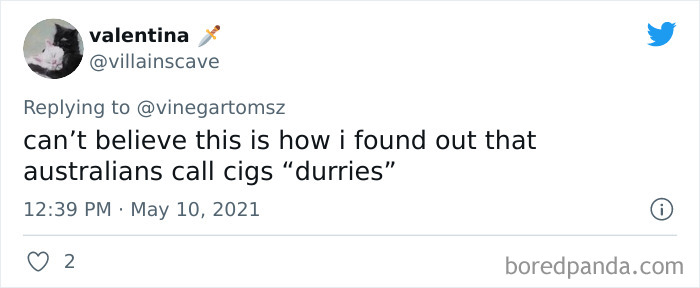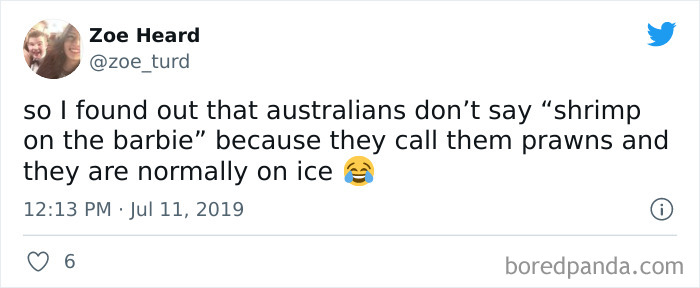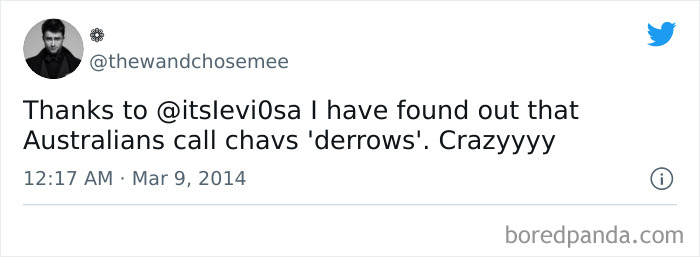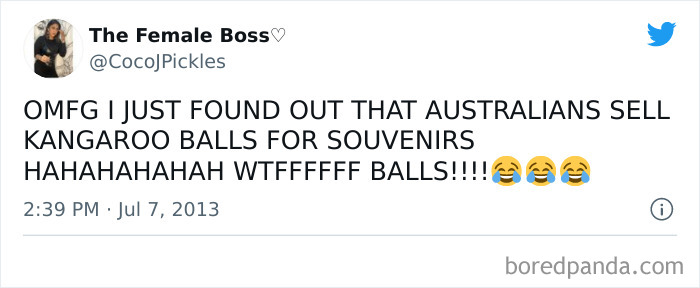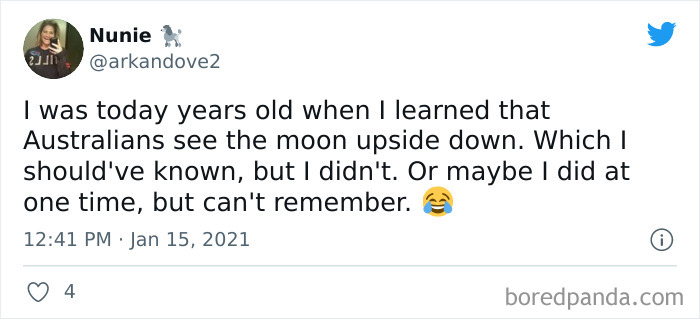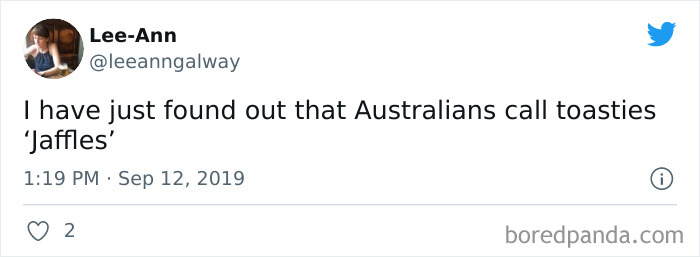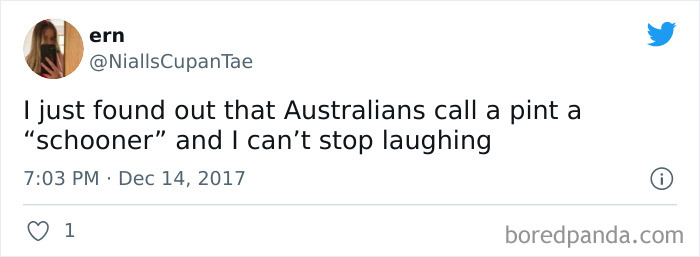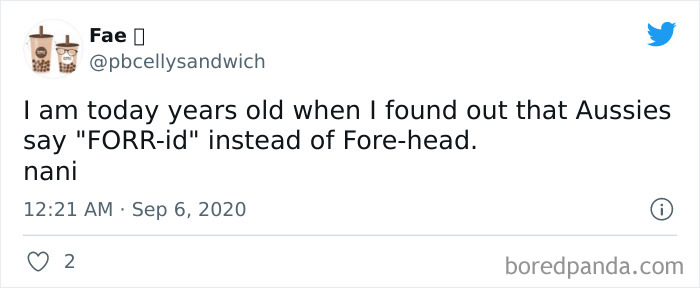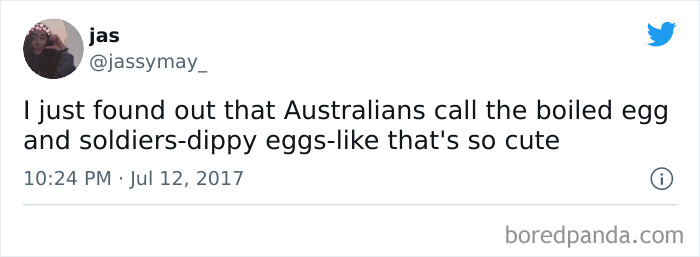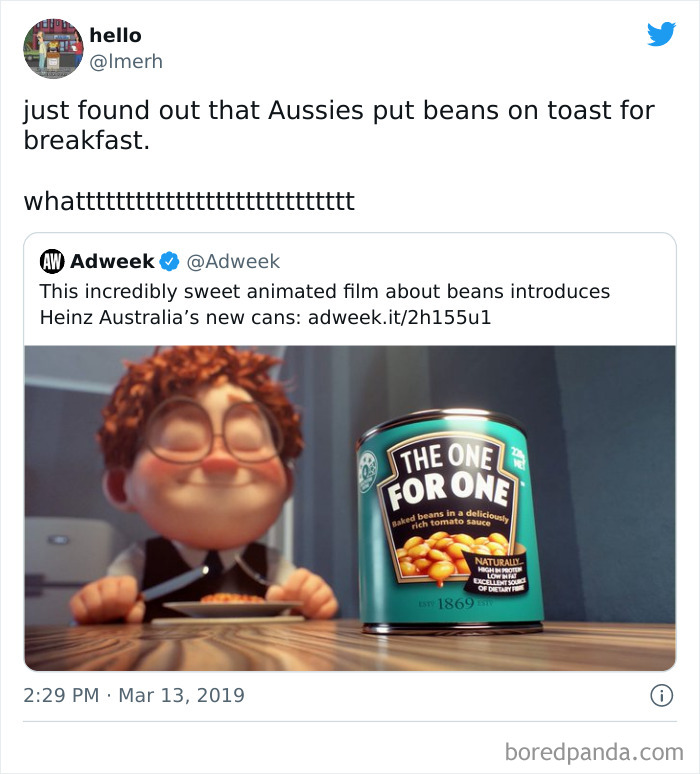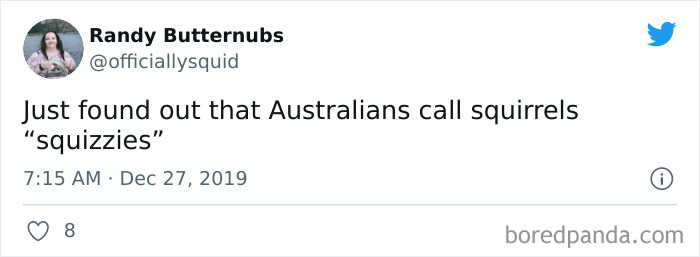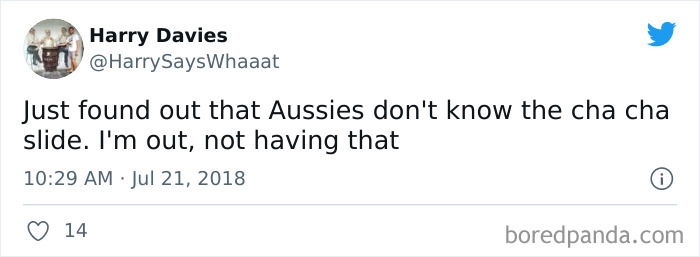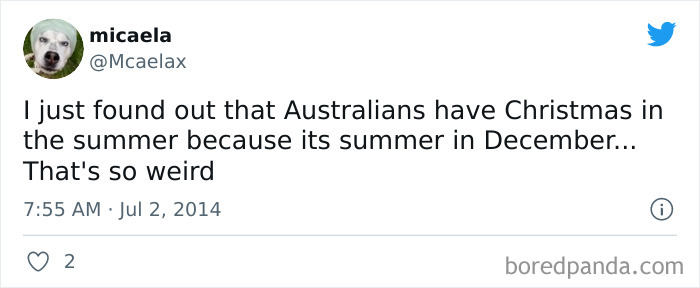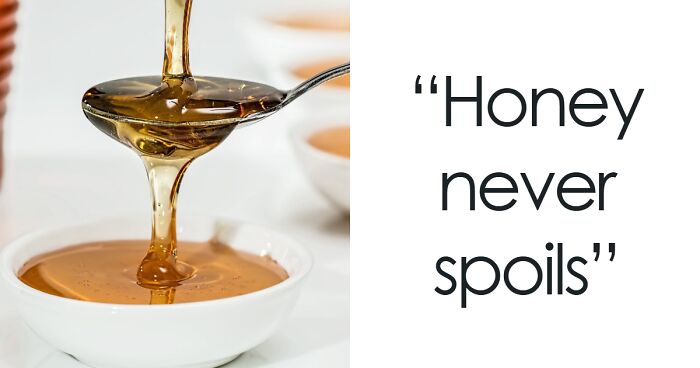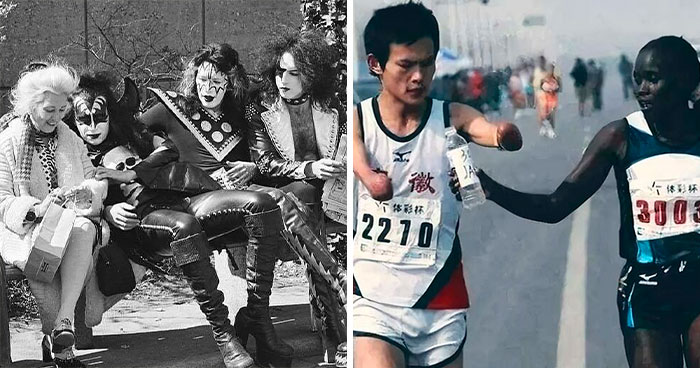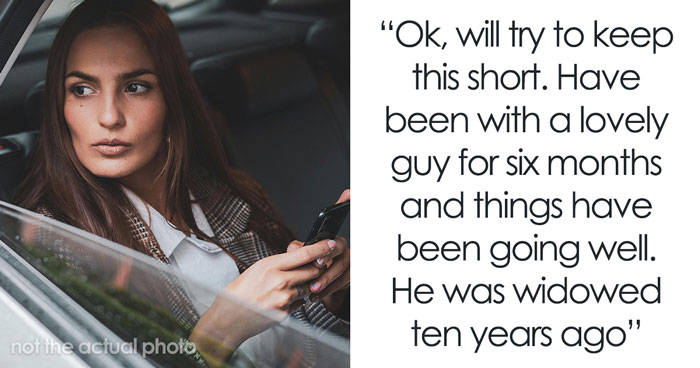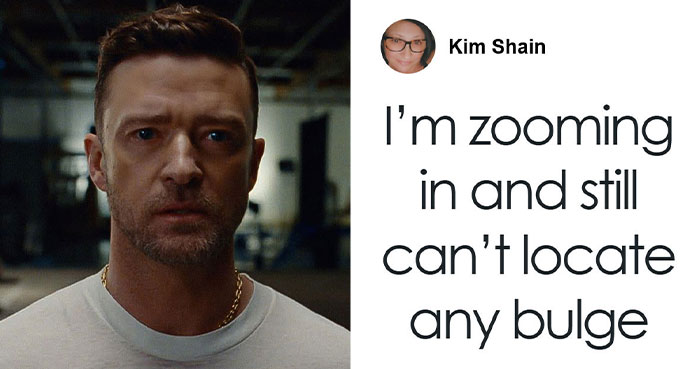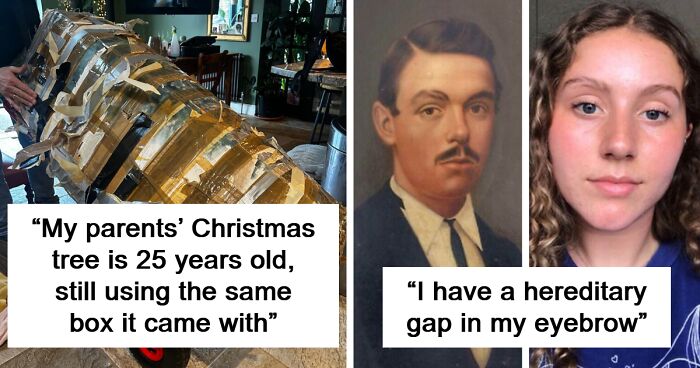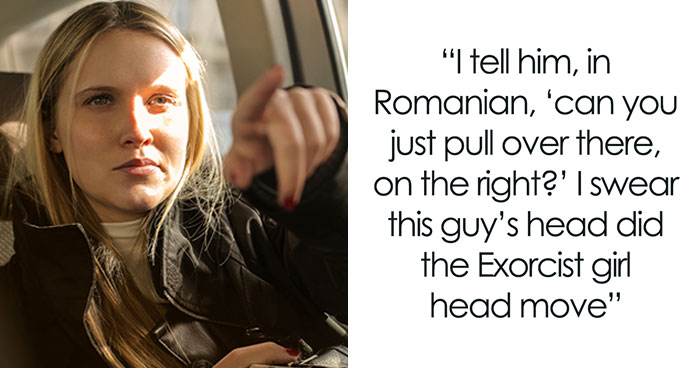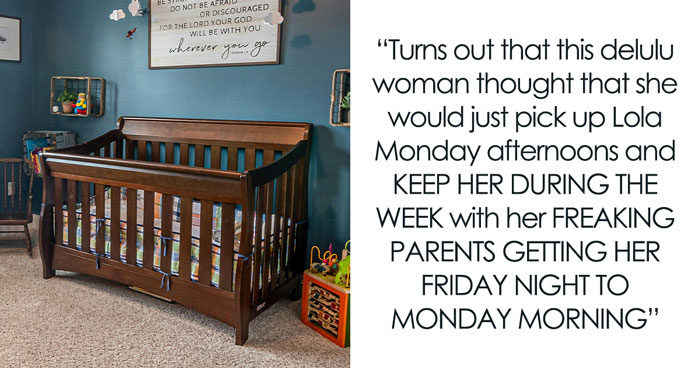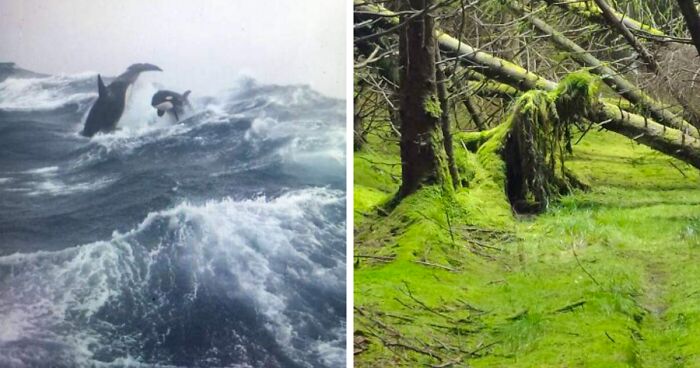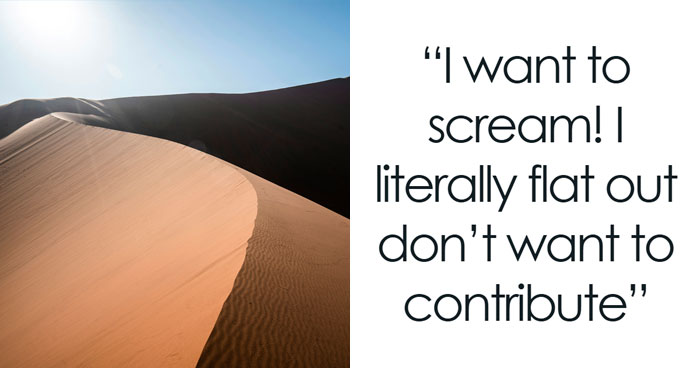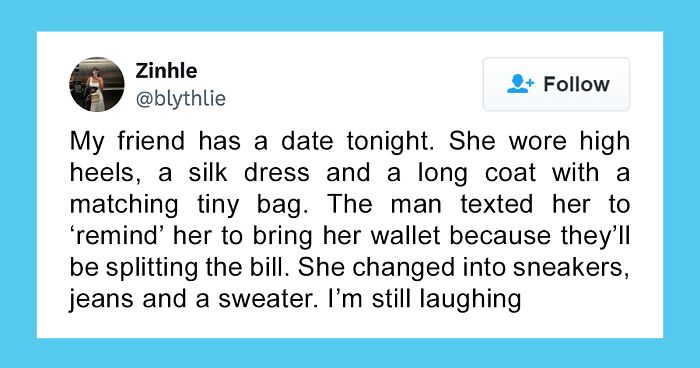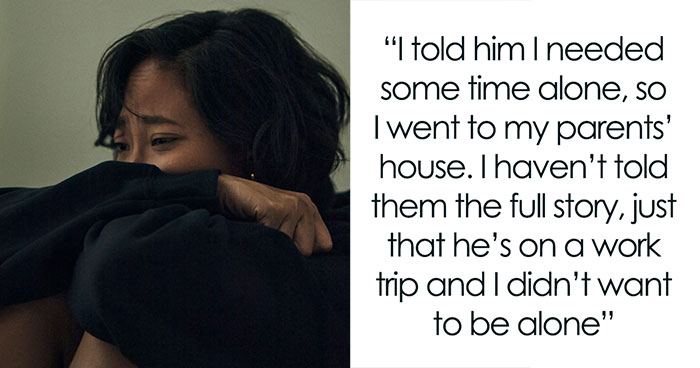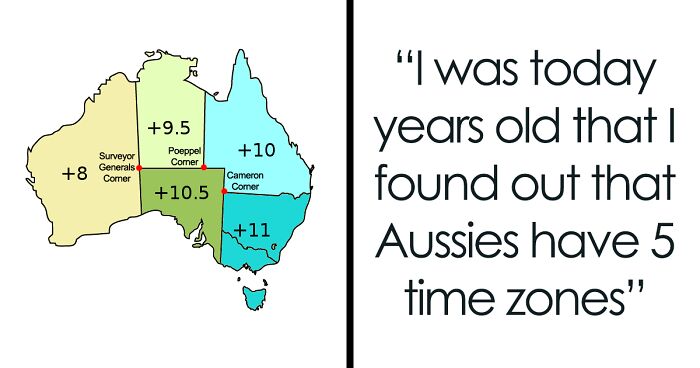
30 Funny Things Non-Australians Found Out About Australia And Can’t Stop Laughing At
Quick, Pandas, what are the first few things that pop into your mind when I mention Australia? If we were to go by stereotypes alone, odds are that you might have thought along the lines of poisonous wildlife, koalas, kangaroos, boisterous yet friendly locals, God-tier surfing, delicious barbeques, and all-around having a great time at the beach. However, Australia is far more than just what we learn about it from movies, TV shows, and the news (though those can help us get a better handle on the culture). And a lot of the magic lies in the language.
Sure, we might all be speaking English, but Australians have a whole host of colorful phrases, fun expressions, stunning slang and take some truly magnificent linguistic liberties that are just as impressive as the country’s vast biodiversity. And Bored Panda has traveled all over Twitter to share how non-Australians reacted when they learned about some of these interesting turns of phrase, as well as a sprinkling of some other interesting Aussie facts. Cultural quirks that we love? You bet! Of course, keep in mind that some of these phrases are just the internet having fun and taking the mickey.
Scroll down, upvote your favorite tweets, and let us know which of them made your day the most, dear Pandas. Personally, I think that saying ‘fairy floss’ instead of candy floss and calling astronauts ‘Austronauts’ is truly, deeply ingenious.
I was curious to learn about how differences in the same language develop in different places, how expressions get entrenched in languages, and how we can become more aware of fun linguistic tendencies in our native tongues, so I reached out to Lisa McLendon at the University of Kansas.
"Any living language is always changing, and different regions/groups/subcultures take the language in different directions," she told Bored Panda, adding that geography is also a "significant factor" in language change. Lisa is the William Allen White Professor of Journalism and Mass Communications and the coordinator of the Bremner Editing Center at KU. Scroll down for the full interview.
This post may include affiliate links.
Never heard anyone in England say fairy floss
Load More Replies...I just found out that Americans call fairy floss “cotton candy” and am utterly confused, as it has no reference to the actually fairies who made the sweet confection.
Cotton candy is also sometimes called spun sugar, but my understanding of spun sugar is thicker, glossier strands. I once tried to make it for a cake decoration... it was a mess, hot syrup pulled between two forks...
Yeah, it's the same stuff, was known as candy floss, as it still is in Britain. Just someone invented a machine to do the spinning and introduced to the US and by extension some of the other newer countries as Fairy Floss. The name changed idiomatically in US to Cotton Candy. But it was invented in Itally during the 1700s.
Load More Replies...What part of the fairy is the floss or produces the floss? I mean I know how we get silk from silkworms.
I am Arab, and if you translate the Arabic for "cotton candy", it is literally "girls' hair''
No. It was known as candy floss, introduced to US as Fairy Floss. Was originally invented in Italy during 1700s, so its original name I don't know but might involve something like "zucchero" which is Italian for sugar, but I think "dolci" is specifically sweets (at least, I know that "levito per dolci", which is Italian for bicarb soda, literally means "raising for sweets"), though I also have no idea when that might have become a word, and sweets in general weren't that common at that time. And also most names for it seem to involve a word for something with soft fibres augmented by a word meaning sweet. The floss part is referring to fibres, and fibre in Italian is "filo" (and you can see a connection between filo and floss, which is pluralised). Whereas, someone here mentions that he just refers to it as Suikerspin (spun sugar) in the Netherlands, which is what it is and what the technique is still known as, so maybe the original name was something more similar to that. If I put "spun sugar" into a translator as I have just now I get "zucchero filato", and if I translate just "filato" back to English I actually get "yarn". So, that'd be my guess as to what the original name was, as it was invented in Italy, is still known as spun sugar, and Fairy Floss was a kind of brand name, cotton candy a US idiom, and candy floss would itself be an Anglicisation. Zucchero Filato. Translated directly, it seems that it is sweet yarn or sugar yarn, but more correctly it is candy floss, as it is made using candied sugar and yarn is what is produced by spinning together fibres, or floss (filos). Also explains why it's called "spun" sugar, as the original technique doesn't involve "spinning" anything, but more like a pulling. The machines that do this I presume just have a spinning mechanism that facilitates the pulling, bringing a surface into contact with hot candied sugar and pulling it away quickily to draw threads. (Just looked that up, too, and actually it uses centrifugal force to pull the heated sugar through fine holes.)
Load More Replies...Candy floss in SA or "spook se asem" in Afrikaans which translates to "ghosts breath."
Possible explanation here: https://www.emelbourne.net.au/biogs/EM01119b.htm
Load More Replies...no, Mat, Americans call "fairy floss" cotton candy -- which makes it sound so dreadfully yuck!
no. Americans for some weird reason call Fairy Floss ' "cotton candy"
British apparently call it candy floss. Sounds like a weird middle ground to take, so I just looked it up and that's apparently the original name from 18th century Europe (1700s). Apparently originally created in Renaissance Italy, hand spun, very expensive. So, I guess cotton candy and fairy floss would have followed on from that. Makes sense to me. Cotton candy is a very straightforward and pragmatic paraphrasing, with cotton possibly having more meaning to even an earlier American ear. And, actually, I think I've heard it being termed candy cotton (as opposed to cotton candy) in older references, which would preserve the progression from one vernacular into another (candy floss > candy cotton > cotton candy - where floss is shirt fibres of some material, like the silk on a cocoon, and so harvested cotton in its natural form might be called cotton floss). But am also reading that while the term fairy floss is the term pretty much exclusively used in Australia (and I guess also NZ), the term was first given by a pair of Americans when they introduced it to the US at the World Fair. Seems odd that any particular reference to Fairies is now an almost exclusively Australian (and I would guess Kiwi) thing. But perhaps now we know how that happened.
well I am 70 years old, and as far as I can remember, my Nanna called it Fairy Floss when it first came into existence back in the day :)
From what I'm reading, "Back in the day" = Renaissance Italy (1700s). Introduced to US at the World Fair in 1904 by two guys after earlier inventing a machine to spin it. They branded it Fairy Floss. Before then it was all spun by hand, originally by expert chefs, and sugar was expensive, so historically it was a rare delicacy only enjoyed by the wealthy. During that time it was called Candy Floss in Europe (or, I suppose, various local variations translating to the same). Australia would have adopted the term Fairy Floss as it earlier did with a lot of US cultural references, particularly through direct exposure, tv and movies, and mateship during and after the great wars. The term Cotton Candy seems to be an idiom that later spread in the US to become the common vernacular in US.
Load More Replies...I would've thought they'd call it something like "rainbow funnel web" or something :P
Australians would be more likely to name it something intended to seem on the surface a bit vulgar or offensive, like bum fluff or something (which is even more cheeky because in Australia a fluff is a fart, aka a windy pop - kid's nomenclature/socially acceptable). That's the Australian sense of humour - extending some sweet delicacy to a peer and asking if they'd like some bum fluff, grinning from ear to ear. But we didn't invent the term Fairy Floss. It is apparently what it was called when first introduced to US at the World Fair in 1904 by a pair of guys who a little earlier invented a machine to spin it. Australia would have adopted the term when our shows (what we call large fairs, I expect stemming from that they often incorporate cattle shows or whatever) and entertainment/amusement parks would have been importing those machines. Same way we would have gotten the term Hot Dog and those of various other treats, though most are sooner or later rebranded. Like, we don't use the term "soda", short for "soda pop", but instead call it "soft drink" (which I thought had something to do with carbonation but is apparently just in contrast to "hard drinks", i.e. non-alcoholic drinks as opposed to alcoholic drinks), or more commonly "fizzy drink" (because we tend to keep using the terms we used as kids - so we also often say things like "ta" instead of "thank you" - from this and some of the other examples I've given you can see that there's something to do with parenting and polite language in social situations or something that eventually works its way into our common vernacular, like when mum says "ta" enough it just becomes automatic, then when you are around enough mums saying "ta" it rubs off - I don't believe I was ever taught to say "ta" as a kid but rather "thank you", thought it sounded a bit weird, childish or something when I first noticed it, but picked it up somewhere, as an adult, maybe when raising my kids, and I say "ta" all the time now). And we don't use the term Corn Dog, but, depending on locality, maybe the shop or vendor, and to a lesser degree the actual product we call them battered savs (saveloy is a large spiced sausage, and is also a euphamism), dagwood dogs or pluto pups. These latter two sound also particularly American to me, might be names imported as specific or generic branding of those products, though Dagwood dog might be referential to its genesis, the use of pluto in that name might simply be more indicative of the era and show/"showie" culture (showie = person who works at shows; equivalent to "carny"), whereas battered sav, which to me seems by now far more common - is more idiomatic. Back to the topic at hand: originally, before its introduction to USA it was called Candy Floss in Europe (or, I expect, some local translation thereof) and was apparently invented in Italy in the 1700s, when it was spun by hand by expert chefs and eaten only by the wealthy (as sugar was expensive and relatively rare, as was possessing chefs). Seems cotton candy was a local idiom that eventually spread nationwide in USA and little beyond. By that time Australia would have already widely adopted the term Fairy Floss, which would by then have become fixed (these trends moved much more slowly back then, depending more on word of mouth and is why these variations exist).
Load More Replies...In many states of India, there are smaller balls made of cotton candy and they're called "Dilli ka laddu" (meaning laddu of Delhi)..
Lisa from KU shared with Bored Panda how certain expressions, like the fun Australian phrases featured in this article, become part of our everyday life and win out over alternatives.
"Some new words and phrases catch on quickly because they refer to something new: an object, an action, a job. Think about all the terms surrounding social media that didn’t exist 10 or 15 years ago. When a new thing comes along, we have to call it something," Lisa explained that innovation can drive changes in language.
The funny thing is that our public holiday is not actually on the Queens birthday.
Popularity via media can be another way how slang spreads. "But then there are slang words and words that shift in meaning. Sometimes those move into the mainstream from a specific region, group, or subculture. How? One way is media: say a popular TV show, movie or song uses a word—lots of people are then hearing the word and it can make the transition from niche to national."
Though not all expressions can boast about their longevity. Some are simply fads that fade into obscurity far too quickly while others become part of the essence of the language itself. "Sometimes these are a 'flash in the pan'—popular for a short time but quickly pass. Sometimes they stick around and are adopted into the lexicon. Why? It depends on a lot of factors that aren’t entirely predictable, such as whether the term is useful or adds something needed in the language."
Lisa noted that nobody can force expressions to be adopted, this process needs to be natural. "The move needs to come from the users of the language: Most changes imposed from the 'top down' don’t stick."
What's more, Lisa told Bored Panda how we can become aware of some of the more interesting aspects of our language, such as all the colorful phrases that we use.
"The easiest (and most fun) way is through media from other cultures that speak the same language. For instance, if you’re an American English speaker, you’re in a new world of words when you watch Australian or British shows or movies, or even ones from the US that focus on a region or group different from your own. Language is a rich and beautiful thing, and with all the streaming options available now, it’s easy to find something that doesn’t have the 'same expressions all the time.'"
Professor Christine Vogt, who heads Arizona State University’s Center for Sustainable Tourism, explained to Bored Panda that we should all take the time to learn about local customs and the language before heading abroad. In this case, it might mean catching up with Australian slang. This article might be a small primer, but you can find a more comprehensive list right here.
"More than likely that is what draws a person to visit a certain place. The more local knowledge a traveler has, the more a traveler can feel like a local and fit in," Christine told Bored Panda during an earlier interview.
Well this guy is calling his poodle cocker spaniel cross the wrong thing now, he should be calling it a spoodle. A sproodle is a Springer spaniel poodle cross. We also have the much better name for a golden retriever poodle cross, groodle. I mean what dumb person calls them goldendoodle, it's as bad as cockerpoo.
"Local customs can include how a traveler dresses, eats, uses a cell phone, etc. When a traveler is out in a community such as walking in a downtown area or eating in a restaurant, these local customs can come into play,” the expert said.
“For example, in Buddhist countries, a woman who has not covered her shoulders or legs may not be allowed into temples or even a restaurant. Learn as many local customs as you can and a few key words to enhance your experience," the professor said that we should learn to adapt to the local cultures so we can enjoy them to the fullest. It’s best to participate them instead of looking in, lost, from the outside.
Canadian here - around here we call them that too (though it might be a local / regional thing)
As I wrote in my earlier article about Australia being the ‘Land of Nope,’ there’s a lot of wildlife there that might make visitors to the country pause for a bit and reorganize their life priorities. Around 100 of the 170 snake species living in Australia are poisonous. Meanwhile, 21 of the world’s 25 most venomous snakes also call the Land Down Under their home. However, casualties are few and far between.
That's actually a common shortening/nickname for many things in Australia. Documentarys are doccos, people named Dave can be Davo, service stations are servos, bottle shops are bottle-os.
What’s more, Australia’s also home to over 2.4k different species of arachnid. Though, keep in mind that fewer than 50 Australian spider species actually pose a threat to people. All the others are fairly friendly. One thing that should definitely help you get over the creepy crawlies is the colorful slang and the friendly locals. Australia’s more than its snakes and spiders. So much more.
Really? Just because a handful of people call it something doesn't mean it's an Aussie term. Another one I have never heard before.
The term derives from Sylvanus Bowser, American inventor of the first self-service fuel pump
Given it's a German brand, I don't think you pronounce it properly either.
Yes, so do we Brits. Could this be because Australia is a British colony?
We also play Goon Roulette! It's like Spin the Bottle, except you hang a goon bag from the clothesline, get a bunch of friends to stand around it in a circle and then spin the clothesline. If the goon bag stops near you, you drink! Then spin again!!
TLDR - Americans find it hilarious and weird because other people say different things to them.
When I think about it, I'm fine with the concept of being amused by words other people use. If it becomes a double-entendre for you, that would be funny. So maybe the problem isn't that they found it funny, but more the "why" and "how" they found it funny. There seems to be some sort of underlying arrogance to these posts where the authors are saying "these silly Australians are using wrong words", which is condescending. And then there is the "shock" that different words are used, which is ignorant. But maybe I'm reading between the lines too much.
Load More Replies...Many of these are British English and are used in the UK and many other English-speaking countries, rather than being anything specific to Australia.
People should not make assumptions as to how others speak from different countries. I love reading about Australia. I think it would be an amazing place to visit. Perhaps this would have been better if it were people asking what things were called rather than assuming the information they posted was true. It seems that most of these were incorrect and some may have been offensive to the Australians. I like how they defended themselves and gave the correct information.
Most of these were complete rubbish, half of the rest were inherited from Britain, some of these could be regional, a couple were correctly in use and ABSOLUTELY none of them will make you change your life, cry with laughter or question your entire belief system....
The term whipper snipper changed my life. I get a real giggle when I have to trim my lawn, just by adopting that small name.
Load More Replies...This thread could have been called "Here's a list of arrogant, ignorant pricks who think they own the English language."
Whoever startet this phrase „I was today years old…“ Sorry, this doesn‘t make sense.
If anyone interested in actual facts (researched) on Australia and our differences etc check out https://www.boredpanda.com/gday-from-straya-15-posts-about-the-weird-and-wonderful-we-have-to-offer/?utm_source=google&utm_medium=organic&utm_campaign=organic
It's one of my first articles so the layout is not the best. And yes I'm plugging myself lol.
Load More Replies...The amount of inaccuracies in this post is ridiculous! 😂 I've never heard of most of these. I don't know where the heck they're getting this information from. 😂
Midge biscuit - If you watch Fox News, you'll see you can just pull stuff right out of your a**e ;-)
Load More Replies...I think Americans need to get out more. A lot of these are either fairly universal or not even common in Australia.
they get the general attitude though. There's no set of abbreviations, but we all have our own ones
Load More Replies...So many of these so called Australian words I have never heard of! I'm a 61 year old Aussie.
Cockies = cockatoos. Apparently cockies = cockroaches in the US. Which explains why people weren't happy when I said we had dozens of wild cockies visit and I fed them every day. 😅
I'm picturing the scene in Beauty and the Beast where Beast is covered in birds. Beautiful. Now I'm replacing those birds with big fat cockroaches...
Load More Replies..."I just found out that Australians call **my ridiculous regional name for something** by **a different ridiculous regional name**! " Some of it was interesting, though.
Hmm...so characterizing everyone in a country by the things a few of them say or do is at best inaccurate and at worst downright offensive. Got it. I can't help but feel I've seen this somewhere else recently...
one you forgot is we call americans "seppos". shortened from "septic tank" which is rhyming slang for "yank"
This is way too funny to me. I'm not even insulted, either. Is "seppo" a regional word? What part of Oz?
Load More Replies...I'm wondering if Aussies don't just make some of these up on the spot just to f**k with tourists. I'm wondering because it's what I'd do.
There's a good few on here that's regularly said here in Scotland. But even at that haven't these people ever watched neighbours? Not one of these surprised me
That is because Maccas in unmentionable (rubbish food for bogans),
Load More Replies...I found a lot of these rather embarrassing... not being aware there was a southern hemisphere... beans on toast... I can say that all the Americans that I know and love are fully aware of most of these things, we're not all benighted.
Seems like some of theses things they learned came from those ridiculous Foster Commercials judging by the Aussie responses.
TIL that a lot of pandas have ludicrous over-reactions to Aussie terminology
Lots of these entries aren't purely Australian. I'm English and I use a large number of these words/terms.
Americans need to get out (of the US) more. And if you did, you'd notice, that like your own language, most of it is derived from the UK regions (brolly, urn, le weekend), (depending on which region the colonists or prisoners sailed from). Likewise many commonly used words entered English usage the same way (bungalow, jodhpurs). Cofvefe is an all-American term that has travelled well (for all the wrong reasons)😄
They left "ute," "brekkie" and "prezzies" off the list. I've watched enough Australian TV to know those are the names for SUV, breakfast and presents.
As a born and raised Aussie it is enlightening to know that other countries don't call it this stuff, also some of this is completely random XD
TIL that Australians nick most of their sayings from England.
Seeing as Anglo Saxon Australians originated from England and then the huge influx of Britain's coming over as 10 pound poms, what would you expect.
Load More Replies...Where I live in Canada, we are lucky enough to have an Australian restaurant. Most of the dishes are very close to standard Canadian, but include ingredients (when available) such as Kangaroo, emu, croc, & others.
We have hot dogs and corn dogs in Australia, but we call corn dogs, Dagwood dogs and hot dogs are called hot dogs. You will find hot dogs at pretty much every fish and chip shop, many servos and cafes and supermarkets etc. Dagwood dogs aren't as common but they sell them in the supermarket, events and some takeaway joints.
Load More Replies...I actually did write an article with actual research and facts about Australia and also our differences.
Load More Replies...This is about the stupidest page I've ever seen on Bored Panda. Slang is often pretty regional, And do not take too much note of the Macquarie Dictionary anyway, It is mostly Melbourne or Victorian, usage
I feel like this whole article is just Americans treating people from Australia like they're those little dogs people put in their handbags. This is why no one likes you America, stop acting like like the rest of us are here to amuse you.
TLDR - Americans find it hilarious and weird because other people say different things to them.
When I think about it, I'm fine with the concept of being amused by words other people use. If it becomes a double-entendre for you, that would be funny. So maybe the problem isn't that they found it funny, but more the "why" and "how" they found it funny. There seems to be some sort of underlying arrogance to these posts where the authors are saying "these silly Australians are using wrong words", which is condescending. And then there is the "shock" that different words are used, which is ignorant. But maybe I'm reading between the lines too much.
Load More Replies...Many of these are British English and are used in the UK and many other English-speaking countries, rather than being anything specific to Australia.
People should not make assumptions as to how others speak from different countries. I love reading about Australia. I think it would be an amazing place to visit. Perhaps this would have been better if it were people asking what things were called rather than assuming the information they posted was true. It seems that most of these were incorrect and some may have been offensive to the Australians. I like how they defended themselves and gave the correct information.
Most of these were complete rubbish, half of the rest were inherited from Britain, some of these could be regional, a couple were correctly in use and ABSOLUTELY none of them will make you change your life, cry with laughter or question your entire belief system....
The term whipper snipper changed my life. I get a real giggle when I have to trim my lawn, just by adopting that small name.
Load More Replies...This thread could have been called "Here's a list of arrogant, ignorant pricks who think they own the English language."
Whoever startet this phrase „I was today years old…“ Sorry, this doesn‘t make sense.
If anyone interested in actual facts (researched) on Australia and our differences etc check out https://www.boredpanda.com/gday-from-straya-15-posts-about-the-weird-and-wonderful-we-have-to-offer/?utm_source=google&utm_medium=organic&utm_campaign=organic
It's one of my first articles so the layout is not the best. And yes I'm plugging myself lol.
Load More Replies...The amount of inaccuracies in this post is ridiculous! 😂 I've never heard of most of these. I don't know where the heck they're getting this information from. 😂
Midge biscuit - If you watch Fox News, you'll see you can just pull stuff right out of your a**e ;-)
Load More Replies...I think Americans need to get out more. A lot of these are either fairly universal or not even common in Australia.
they get the general attitude though. There's no set of abbreviations, but we all have our own ones
Load More Replies...So many of these so called Australian words I have never heard of! I'm a 61 year old Aussie.
Cockies = cockatoos. Apparently cockies = cockroaches in the US. Which explains why people weren't happy when I said we had dozens of wild cockies visit and I fed them every day. 😅
I'm picturing the scene in Beauty and the Beast where Beast is covered in birds. Beautiful. Now I'm replacing those birds with big fat cockroaches...
Load More Replies..."I just found out that Australians call **my ridiculous regional name for something** by **a different ridiculous regional name**! " Some of it was interesting, though.
Hmm...so characterizing everyone in a country by the things a few of them say or do is at best inaccurate and at worst downright offensive. Got it. I can't help but feel I've seen this somewhere else recently...
one you forgot is we call americans "seppos". shortened from "septic tank" which is rhyming slang for "yank"
This is way too funny to me. I'm not even insulted, either. Is "seppo" a regional word? What part of Oz?
Load More Replies...I'm wondering if Aussies don't just make some of these up on the spot just to f**k with tourists. I'm wondering because it's what I'd do.
There's a good few on here that's regularly said here in Scotland. But even at that haven't these people ever watched neighbours? Not one of these surprised me
That is because Maccas in unmentionable (rubbish food for bogans),
Load More Replies...I found a lot of these rather embarrassing... not being aware there was a southern hemisphere... beans on toast... I can say that all the Americans that I know and love are fully aware of most of these things, we're not all benighted.
Seems like some of theses things they learned came from those ridiculous Foster Commercials judging by the Aussie responses.
TIL that a lot of pandas have ludicrous over-reactions to Aussie terminology
Lots of these entries aren't purely Australian. I'm English and I use a large number of these words/terms.
Americans need to get out (of the US) more. And if you did, you'd notice, that like your own language, most of it is derived from the UK regions (brolly, urn, le weekend), (depending on which region the colonists or prisoners sailed from). Likewise many commonly used words entered English usage the same way (bungalow, jodhpurs). Cofvefe is an all-American term that has travelled well (for all the wrong reasons)😄
They left "ute," "brekkie" and "prezzies" off the list. I've watched enough Australian TV to know those are the names for SUV, breakfast and presents.
As a born and raised Aussie it is enlightening to know that other countries don't call it this stuff, also some of this is completely random XD
TIL that Australians nick most of their sayings from England.
Seeing as Anglo Saxon Australians originated from England and then the huge influx of Britain's coming over as 10 pound poms, what would you expect.
Load More Replies...Where I live in Canada, we are lucky enough to have an Australian restaurant. Most of the dishes are very close to standard Canadian, but include ingredients (when available) such as Kangaroo, emu, croc, & others.
We have hot dogs and corn dogs in Australia, but we call corn dogs, Dagwood dogs and hot dogs are called hot dogs. You will find hot dogs at pretty much every fish and chip shop, many servos and cafes and supermarkets etc. Dagwood dogs aren't as common but they sell them in the supermarket, events and some takeaway joints.
Load More Replies...I actually did write an article with actual research and facts about Australia and also our differences.
Load More Replies...This is about the stupidest page I've ever seen on Bored Panda. Slang is often pretty regional, And do not take too much note of the Macquarie Dictionary anyway, It is mostly Melbourne or Victorian, usage
I feel like this whole article is just Americans treating people from Australia like they're those little dogs people put in their handbags. This is why no one likes you America, stop acting like like the rest of us are here to amuse you.

 Dark Mode
Dark Mode 

 No fees, cancel anytime
No fees, cancel anytime 



